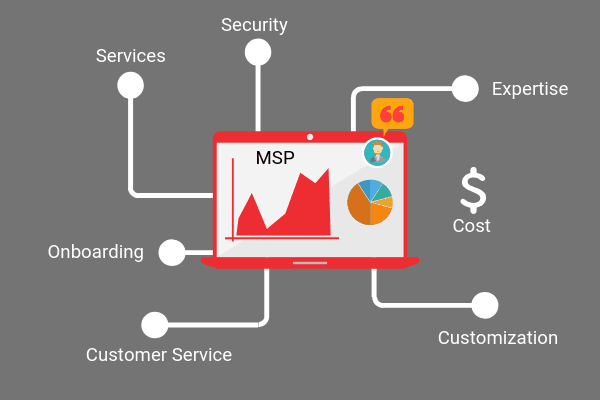Almost every business today experiences growing pains associated with IT infrastructure and service costs. The truth is that most small and medium-sized businesses simply don’t have the budget or focus to fully manage IT and data solutions. Using a managed service provider (MSP) to manage these parts of their business can be a cost-effective alternative.
What Does an MSP do?

An MSP is a third party that partners with company executives and business leaders to take over certain parts of their business, such as cloud, IT projects and support. MSPs leverage their expertise, technology, partnerships, and process solutions to help efficiently scale IT services. Once your systems are up and running, they can maintain your IT infrastructure, providing support 24/7, 365 days a year. These are the expectations of a competent MSP, when something breaks, it gets fixed. However, an excellent MSP goes above and beyond break/fix situations to help design an IT infrastructure that supports business growth, increases efficiency and reduces costs.
How to Choose the Right MSP
There are a variety of factors to consider before selecting a managed services provider- here’s a checklist of things to ask yourself and ask the MSP. This is not a one-size fits all guide so make sure that the organization fits with your workflow and long-term IT goals. It’s also vital to understand your immediate business needs before talking to any MSPs. This will help you put together a clear list of wants and needs, as well as the services you’ll require the organization to provide. That leads to our list:
1. Perform an IT assessment to understand your current situation
Audit your existing IT resources to account for the number of servers, computers and networks you have, as well as the types. What software applications are essential for your business operations? How is your data being stored? Are you using cloud application services, or SaaS such as Office 365, Dropbox, ERP software or SalesForce? What does your existing IT security look like? Is access to your system restricted to in-house employees or can users remotely connect to certain applications? A good MSP will send you an onboarding document to cover all aspects of your existing IT but it’s best to have a general of your needs beforehand.
2. Determine the specific service you want the MSP to provide
Based on your assessment of your existing IT operation, determine the minimum set of requirements you expect the MSP to provide. The most commonly demanded services include secure data storage, backup, and disaster recovery (69%), network management (66%), and end-user or help desk support (52%). A Good MSP should include these services at a minimum and provide scalable solutions. Below are a few additional services that should factor into your decision.
3. Does the MSP Provide 24/7, 365 Remote Management and Monitoring?
A good MSP should be able to automate the management and monitoring of your IT infrastructure, including workstations, servers, network devices, firewalls, routers, and switches at all locations. This feature should also enable automated tasks for scheduled updates and monitoring. Alerts can either trigger your IT team or a tier-one help desk to engage the appropriate response action.
4. Does the MSP provide remote and on-site support?
In addition to remote monitoring and tier one support, the MSP should also provide face-to-face interactions with your IT team. On-site visits are essential for proper maintenance of your hardware and equipment. If this is something your team will continue to manage in-house, it’s still important for an MSP become familiar with your IT infrastructure in failover circumstances.
5. Does the MSP deliver cybersecurity solutions?
Your business should be prepared for cyber-attacks. A good MSP should have a comprehensive security solution with best practices to reduce risk. Make sure you understand their security procedures (penetration testing, IP scanning, compliance, intrusion detection) and how they will be handling your information.
6. Do they Cloud and Mobile Solutions?
Business operations are gradually moving over to the cloud. Offering scalable solutions for the cloud is essential for modern managed service providers. Are they vendor-neutral or do they work specifically with one CSP? Can they customize cloud solutions to run with your business? Do they offer hybrid cloud or multi-cloud solutions? This will give you a better idea on how well-versed they are in cloud solutions.
7. Does the MSP have tenure in its respective space and industry?
A good MSP should be a long-term fit so it’s important to ensure that they have a healthy relationship with their existing clients. This may require a nuanced approach so speak to a few prospective managed service providers and see how they differ. Do they have blog posts, case studies, testimonials and other downloadable resources? A good MSP is a thought leader that drives the conversation forward among peers. Ask the vendor for a list of current and past customers as well as references. Research what publications and industry experts say about the company. Ask the MSP about their future and see if their values align with yours.
8. Does the MSP provider a formal and comprehensive service level agreement (SLA)?
An MSP should have a professional and water-tight contract agreement that specifies in detail the services provided. It should also include verbiage about disputes and penalties should an issue occur. Usually, an MSP will have a standard SLA offered to all clients but if that document fails, it’s important to know what happens next. If the MSP cannot or will not discuss these critical issues with you, it may be a bad sign of things to come.
Bringing an MSP on to your business is a big decision, and you should treat it as such. Choosing the wrong provider can be costly and cause headaches for your entire business operation. Taking the time to perform up-front research can save you time, money and frustration in the long run.
At Pointivity, we pride ourselves on being a proven innovator in the field of Hybrid IT and cloud-based managed solutions. We’ve helped customers with successful business-wide outcomes since 2001. To find out if we’re the right MSP for your business, contact us.








